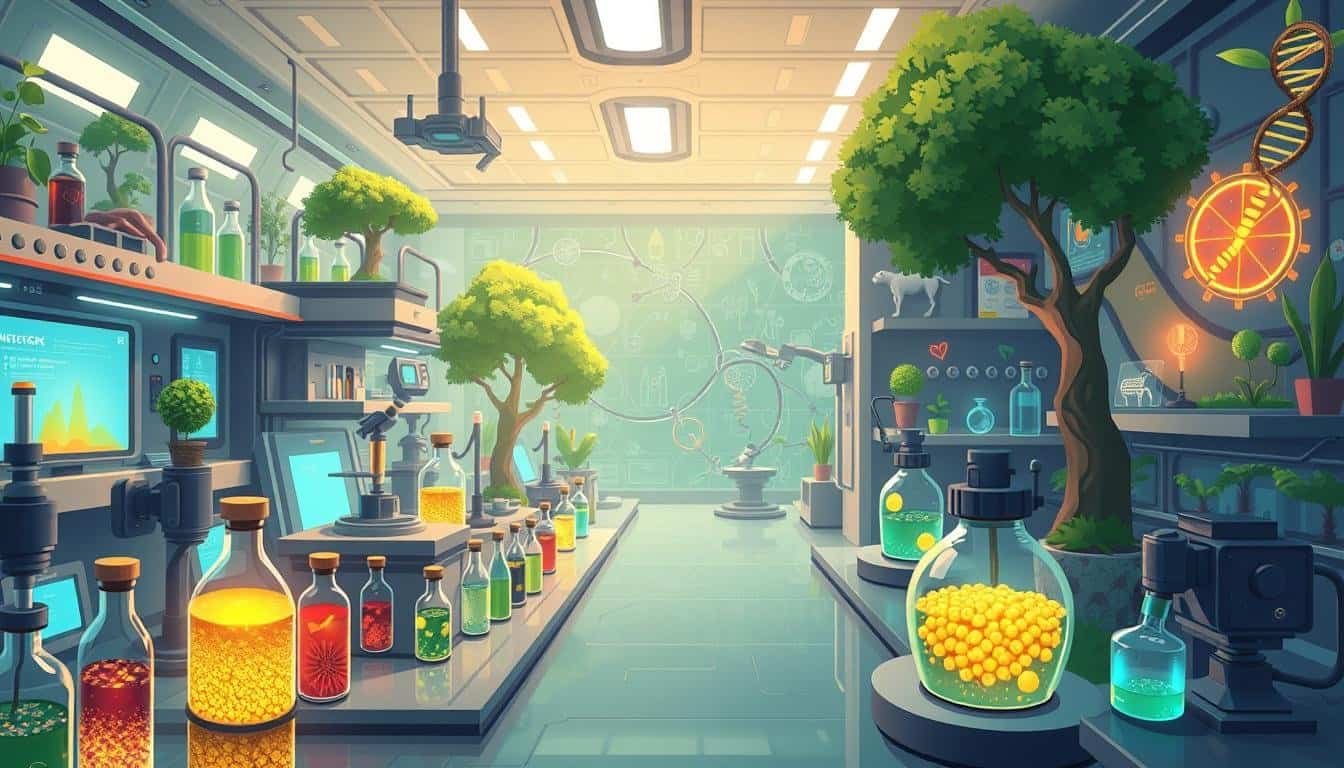The Ethics of Bioengineering: A Philosophical Perspective
As we dive into modern science, a big question comes up: Are we ready to face the moral issues of changing life with bioengineering? The Ethics of Bioengineering is more than a science debate. It’s about deeply thinking about our moral values and duties. This topic has grown, showing how science and ethics work together.
A key article in the World Journal of Advanced Research and Reviews in 2022 by seven experts highlights the need for ethics in biotech. With new tech like bioinformatics and systems biology, we must think more about ethics. This talk will look at the basics of ethics in bioengineering and how they guide our science.
Key Takeaways
- The evolution of bioethics is crucial for navigating bioengineering advancements.
- Philosophical inquiry aids in understanding the moral landscape of biotechnology.
- Interdisciplinary fields like bioinformatics highlight ethical considerations in data usage.
- Societal responsibilities in bioengineering extend beyond technical knowledge.
- Understanding historical ethical frameworks can sharpen contemporary debates.
Introduction to Bioengineering and Ethics
Bioengineering brings together biology and engineering to make new advances in healthcare and research. It’s about designing and changing biological systems, like genetic changes and synthetic biology. Looking into introduction to bioengineering, we see the need to talk about ethics in biotechnology.
Looking back, bioengineering has evolved with ethics changing from old religious views to modern philosophical debates. As we learn more about biology, the ethical issues get more complex. Now, scientists are dealing with things like engineered living machines that mix human cells with technology.
Old ethics rules didn’t cover these new kinds of research. So, we need a new ethics for bioengineering. It combines bioethics and engineering ethics to handle these new challenges.
As bioengineering grows, talking about science and ethics is more important than ever. This conversation helps us innovate responsibly and guides future work in the field.
The Evolution of Bioethics in Bioengineering
Bioethics and bioengineering have grown closer as technology advances. The history of bioengineering ethics shows how ethics have changed with new science. Events like the COVID-19 pandemic have made us think more about ethics in bioengineering.
There was a big change in how biotechnology rules worked during this time. For example, Italy faced tough ethical choices when sharing limited medical resources. This showed the need to put human dignity and basic ethics first in healthcare.
The Italian National Bioethics Committee said not to use age or gender to decide who gets what. They said to focus on what’s most needed clinically instead.
As the pandemic grew, new ways to decide who gets treatment were introduced. These methods looked at who needed it most while staying true to ethics. The global bioengineering community talked about three key topics. They showed how ethics is key in handling crises and supporting science.
Biotechnology is seen as a way to make life better, so there’s a close look at its ethics. This focus is on easing suffering and fighting for global fairness. Making sure everyone can get healthcare and live longer became a big idea during these talks.
Moral Implications of Genetic Engineering
Genetic engineering sparks big debates across many areas. Since 2012, tech like CRISPR-Cas9 has changed gene editing. It lets us fix faulty genes precisely. This has big potential, like treating cancer and helping with HIV. But, it also raises tough questions about ethics.
One big worry is about consent, especially in human research. Women have often been left out of these talks. Now, we’re focusing more on keeping kids’ rights safe. This shows we need strong ethical rules to protect everyone’s rights.
Different places have their own views on genetic modification. In the West, fixing genes for health is okay for many. But in Oceania, there’s worry about what it could mean for future generations. The debate is ongoing about how genetic tech could change society.
There are big talks about changing humans to be better. Some think it’s good, but others fear it could make things worse. They worry about making some people more unequal than others. This also makes some religions uneasy, as they see it as going against nature.
Looking back, we see how far we’ve come in genetic engineering. From early tools to today’s advanced methods, we’ve made big strides. Each step forward makes us think more about ethics and what’s right.
Experts like Michael Sandel make us think hard about these issues. His book “The Case against Perfection” makes us wonder about the future of genetic tech. He encourages us to talk about what kind of world we want with these new tools.
| Aspect | Challenges | Considerations |
|---|---|---|
| Informed Consent | Inadequate representation of women | Child autonomy preservation |
| Cultural Perspectives | Skepticism in Oceania | Acceptance in Western nations |
| Technological Advances | Risks of designer babies | Societal implications of enhancements |
| Ethical Concerns | Transhumanism | Religious beliefs |
Philosophical Perspectives on Biotechnology Ethics
Philosophy and biotechnology ethics meet at a crossroads, sparking deep discussions on our moral duties and the impact of bioengineering. Ethical theories like utilitarianism, deontology, and virtue ethics help us understand the right and wrong in biotech. Each theory sheds light on the complex issues raised by genetic engineering and other technologies.
Utilitarianism looks for the greatest happiness for the most people, often backing biotech that brings big benefits to society. Deontology, on the other hand, focuses on following moral rules and warns against actions that break ethical standards, even if they seem good. Virtue ethics looks at the character and reasons behind people’s actions in biotech, pushing for honesty and accountability in science.
Thinkers like Jonathan Glover and Wolfgang Schirmacher have greatly shaped our thoughts on genetic engineering. They share different views; some see genetic changes as a positive tool, while others worry about its ethical sides. David Heyd and David T. Suzuki have also added to the ongoing debate on biotech ethics.
Sheldon Krimsky has looked into the political side of biotech, helping us grasp its social and policy effects. As we delve deeper into bioengineering ethics, the link with synthetic biology shows the complex moral issues at play.
Studies show a rise in ethical debates on bioengineering from 2000 to 2020, showing more people are thinking deeply about these issues. Philosophers like Mario Bunge call for a deeper look into biotech, pushing for a blend of bioethics and the philosophy of medicine.
The Ethics of Bioengineering: A Philosophical Perspective
Bioengineering is growing fast, making ethical thoughts in biotech more important than ever. It’s key to use technology wisely in healthcare and other areas. Bioengineering touches many fields, bringing up big ethical questions that need careful thought. This part looks at important parts of bioengineering ethics and the tough choices experts face.
Understanding Ethical Considerations in Biotechnology
Looking at ethical thoughts in biotech means thinking about things like informed consent and checking risks. Bioengineers work in a world where their choices can change lives. They must think about things like privacy, fairness, and doing what’s right. These ideas help them make choices that are both right and based on strong moral beliefs.
Case Studies of Ethical Dilemmas in Bioengineering
Real-life examples in bioengineering ethics show the tough choices bioengineers and health workers face. These stories help teach us about making ethical decisions. For example, making medical products and following FDA rules is complex. Lawyers and judges also play a big part in protecting ideas, adding more ethical questions. By looking at these cases, we can learn how to avoid ethical problems and make bioengineering more responsible.
Ethical Implications of Biotechnological Advancements
The fast pace of biotechnology brings up big questions about right and wrong. Since Dolly, the cloned sheep, came out, people have gotten more worried. This event made us think a lot about the ethics of new tech like gene editing and cloning.
Researchers often share their findings with the media before they’re fully checked. This can lead to wrong info and make people more scared of new biotech. Scientists need to explain their work better to help everyone understand.
Looking at the good and bad sides of biotech can help us make choices. Some say we should think about what’s fair for everyone. They want to make sure the benefits and problems of biotech are shared fairly.
Good health care is key for making biotech work for everyone. Thinking about what’s right and wrong in biotech can help us. We look at three ways to think about ethics: consequentialism, deontology, and virtue ethics.
New ways to breed animals and plants have come up fast, but they make people wonder. Old methods took a long time to work, making us worry about how fast we’re moving now. We’re still debating the right way to do things in animal and plant breeding.
Using new breeding methods fast brings up tough questions. We’re caught between not wanting to miss out on progress and dealing with big issues like hunger and climate change. Finding a balance is hard as we figure out how to move forward with biotech.
| Aspect | Description | Potential Impact |
|---|---|---|
| Public Perception | Increased concerns following notable events like the birth of Dolly. | Heightened scrutiny on biotech practices. |
| Research Transparency | Tendency to release results prior to peer review. | Misinformation and public anxiety. |
| Utilitarianism | Evaluating benefits versus harms in biotech research. | Guides ethical decision-making. |
| Distributive Justice | Fairly allocating benefits and burdens of research. | Equitable outcomes across society. |
| Ethical Frameworks | Consequentialism, deontology, and virtue ethics. | Informed ethical discussions and decisions. |
Challenges in Formulating Bioengineering Ethics
Bioengineering faces many ethical issues that need careful thought. As new technologies change healthcare and technology, it’s vital to tackle these ethics. We must link traditional engineering with new bioengineering to ensure they work together well. This mix of old and new brings complex challenges that need a team effort to solve.
The Role of Engineering Ethics in Bioengineering
Engineering ethics in biotechnology and bioengineering is crucial. Important bioengineering achievements, like the artificial kidney and heart pacemaker, have set the stage. Now, with new tech like bionanotechnology and biomaterials, ethics are still evolving.
Key ethical challenges for bioengineers include:
- Ensuring medical interventions help both the individual and society.
- Looking at the risks and safety of new designs.
- Being open with clients and stakeholders about findings.
- Considering feelings in clinical work with new tech.
- Handling the ethics of new innovations, like organ transplants and testing on animals.
About 85% of articles in bioengineering journals talk about ethics. This shows a big focus on these issues. As different fields work together, making engineering ethics a key part of bioengineering is crucial. This will help us understand and set up good ethical practices for new innovations.
| Focus Area | Percentage/Number of Articles |
|---|---|
| Ethical issues in Bioengineering | 85% |
| Conference proceedings on ethical challenges | 5 |
| Annual increase in articles discussing biomaterials ethics | 11% |
| Articles on Biomedical Engineers’ ethical responsibilities | 6 |
| Articles on new technology ethical challenges | 22% |
| Articles on ethical issues in Tissue Engineering | 15% |
| Animal testing ethical issues ratio | 3:1 |
| Need for ethics training in Bioengineering curricula | 40% |
| Articles focusing on dental education ethics | 3 |
| Direct-to-consumer advertising ethical issues | 8% |
| Articles addressing Organ Transplant ethical challenges | 7% |
These stats show how important engineering ethics in biotechnology is for future bioengineering. As professionals think about their roles, creating ethical standards together is key to solving bioengineering ethics challenges.
Conclusion
Bioengineering ethics is a complex area where science meets moral responsibility. It’s important to have ethical rules to guide this fast-changing field. Events like the shuttle disaster show how crucial ethics are for human life and progress.
This article gives a detailed look at bioethics, focusing on big issues for biomedical engineers. These include human experiments and clinical trials. Groups like the FDA and the World Medical Association work hard to protect people’s rights and safety in experiments.
As we look to the future, bioengineering ethics will face many challenges. It’s key to have a common understanding of ethics among everyone involved. By creating strong ethical codes and talking together, we can make sure new bioengineering follows our values. This will lead to a future that is both innovative and ethical.
Source Links
- A Philosophical Perspective on the Bioengineering of Art: Ethical Shifts in Mimesis
- The impact of philosophy on contemporary bioengineering
- Bioengineering Ethics: The Ethics of the Linkage Between Engineering and Biology – The Experiences and Challenges of Science and Ethics
- Towards a New Bioengineering Ethics
- Biomedical engineering and ethics: reflections on medical devices and PPE during the first wave of COVID-19 – BMC Medical Ethics
- Bioethics and biotechnology
- Ethical Perspectives of Therapeutic Human Genome Editing From Multiple and Diverse Viewpoints: A Scoping Review
- Genetic Engineering: Is It Ethical?
- The Case Against Perfection: Ethics in the Age of Genetic Engineering
- Frontiers | The view of synthetic biology in the field of ethics: a thematic systematic review
- Ethics for Bioengineering Scientists: Treating Data as Clients
- The impact of philosophy on contemporary bioengineering
- Thinking Ethically About Human Biotechnology
- An Ethical and Societal Analysis for Biotechnological Methods in Plant Breeding
- Bioengineering Ethics | Encyclopedia.com
- Ethical Challenges for the Biomedical Engineer of the Future
- Why Biomedical Engineers Should Develop Ethical Obligations
- Justice, Equity, Diversity, and Inclusion Curriculum Within an Introductory Bioengineering Course – Biomedical Engineering Education







